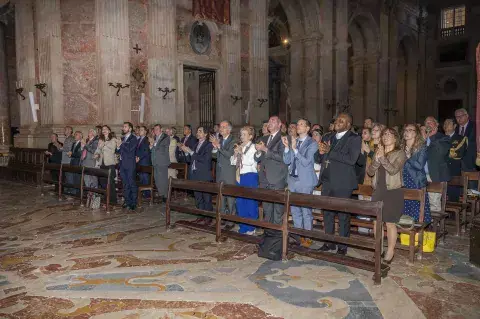The role that interreligious dialogue and cooperation have played in the and his personal vision as a main actor in the Interreligious Platform in the Central African Republic were the starting point for the keynote speech of the Archbishop of Bangui, Cardinal Dieudonné Nzapalainga, at the event "Mafra Dialogues", which took place on 27 and 28 April in Mafra, Portugal.
During his keynote speech, Cardinal Dieudonné Nzapalainga began by showing "gratitude" for the work done by the International Dialogue Centre - KAICIID in promoting interreligious dialogue and cooperation in África. "Its programmes and initiatives have helped build bridges between different communities, foster mutual understanding and respect, and promote a culture of peace of reconciliation”, the Cardinal said. Among the positive and most telling examples of the work done in Africa, the Archbishop of Bangui highlighted the promotion of peace and stability in post-war Rwanda, the efforts of religious leaders in Nigeria, who came together to form the Interreligious Dialogue for Peace Forum to promote peace and reconciliation in the country, and the work of the Platform of Religious Confessions in the Central African Republic in the context of reconciliation and peace building in the country.
In Cardinal Dieudonné Nzapalainga's view, there are a number of factors that contribute to religious conflicts in Africa. One concerns the historical tensions between Muslims and Christians, as seen in Nigeria, for example, which have been exacerbated by political and economic inequalities. Another factor is the role played by external actors who exploit religious differences to their advantage, such as the Islamic State in West Africa (ISWA), which has been active in the Sahel region and has sought to exploit ethnic and religious tensions.
Despite many efforts to promote interfaith dialogue and coexistence around the world, there remain challenges to interfaith dialogue that cannot be ignored. "At the global level, these challenges include the rise of extremism and religious violence, which can fuel conflicts and exacerbate tensions between different communities," the Archbishop of Bangui points out. The reluctance of governments to support interfaith initiatives and the opportunities that social media offer for extremist groups to spread their messages and recruit new members more easily are other factors to be taken into account. "In Africa, the challenges are similar, with the added complexity of historical and cultural divisions that can exacerbate religious tensions. In addition, poverty, lack of education and limited access to resources can also contribute to the marginalisation and exclusion of some religious groups," Cardinal Dieudonné Nzapalainga stressed.
However, despite all these challenges posed, the Archbishop of Bangui praised people and organisations that "continue to work tirelessly to promote interfaith cooperation and dialogue to build more just, peaceful and inclusive societies". Among the organisations the Cardinal highlighted the work done by the African Union and the Holy See.
Regarding the African Union, the Archbishop of Bangui recalled the measures taken by this organization over the past few years to resolve religiously motivated conflicts in the region. Highlights include the creation, in 2013, of the Interreligious Dialogue Forum (AU-IFDF), which brings together religious leaders from across Africa to discuss issues related to peace, security and development. Other actions in evidence to promote religious tolerance are the African Charter on Human and Peoples' Rights and the African Union's Agenda 2063. With these measures "the African Union is helping to create an enabling environment for interreligious dialogue and cooperation and is working to prevent religiously motivated conflicts and promote sustainable peace on the continent," Cardinal Dieudonné Nzapalainga stressed.

From his vision and direct participation in interfaith dialogue for the promotion of peace, Cardinal Dieudonné Nzapalainga left a challenge to political leaders to design policies that promote religious freedom and respect for diversity. "Governments and international organisations must work to create an environment in which people of all religions can practice their faith freely and without fear of persecution or discrimination. This can be achieved through policies that promote religious tolerance and respect for diversity, and by addressing issues such as hate speech and incitement to violence," the Cardinal stresses. To this end, it is essential to support initiatives and organisations that bring people of different religions together, in conferences, workshops and other events that promote interfaith understanding, peace and reconciliation between different communities.
Cardinal Dieudonné Nzapalainga called on political actors to intervene in the underlying causes that lead to conflicts, addressing issues such as poverty, inequality and political instability, which can exacerbate tensions between different communities, without losing sight of how discrimination and marginalisation can create resentment and animosity towards certain religious communities.
Investment in education is another crucial tool to promote inter-religious understanding and prevent religiously motivated conflicts. In addition, Cardinal Dieudonné Nzapalainga calls on politicians to set an example and engage directly in promoting interreligious dialogue and preventing religiously motivated conflicts by participating in interreligious events and initiatives, promoting respect for diversity in public statements and policies and building bridges between different communities.
At the end of his speech, Cardinal Dieudonné Nzapalainga made a clear appeal for the future: "The time has come for political leaders and religious figures to work together to promote peace and stability in Africa and in the world”.

